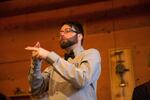
Candidate Philip Wolfe is challenging incumbent city commissioner Nick Fish.
Amelia Templeton / OPB
On a recent evening, hundreds of people packed into a pub for a forum on transportation with the candidates for Portland City Council.
Philip Wolfe, a young activist with a trim beard, Prada glasses, and a bow tie, sat in the middle of the group.
The moderator asked about the city’s spending on transit and bikes, and Wolfe hopped off his stool and pulled a card from his pocket.
“This is my bus pass. No shame, I’m a proud bus pass owner,” he said, getting a laugh from the crowd.
“I frequently rely on mass transit, and honestly there’s not enough. There’s limited routes. We really need to expand those throughout the city.”
It was a perfectly ordinary exchange for Portland politics, with one exception.
Wolfe was bantering with several hundred likely voters through an American Sign Language interpreter. Wolf was up on stage, speaking in sign language, one quick gesture after another, while the interpreter, dressed in black, translated.
Wolfe, who is challenging city commissioner Nick Fish in the primary, is Portland’s first deaf city council candidate. He’s part of a new wave of people who are deaf or hard of hearing and are fighting for a seat at the table in politics.
And just a note: if you listen to the audio version of this story, the voice you hear when Wolfe speaks is his preferred sign language interpreter, Andrew.
“Andrew’s voice is very friendly, from what I have been told, and so I hold on to him for my campaign as much as possible,” Wolfe says.
Wolfe has served two terms on Portland's Commission on Disability, a volunteer group that works to make the city more accessible. He helped successfully lobby the city council to pass legislation requiring Portland bars and gyms to turn on the captioning on their televisions so that the deaf community could get access to programs broadcast in public.
As Wolfe got more involved in politics, he noticed that deaf people were missing. From elected office, from leadership. So he decided to run for city council.
“In the beginning of my campaign, my focus was on policing,” he said.
Wolfe is a police reform activist. He believes all Portland police officers should be wearing body cameras. He once sued the Portland Police Bureau, and thought that police accountability would be the theme of his campaign.
But Wolfe says his focus shifted as he realized how hard it is to run for office with a disability. He’s struggled at times to convince civic groups to provide interpreters for him and for his deaf supporters.
“It’s been so stressful. It's just the fact that it’s not accessible. Therefore, the candidate does not have an equitable opportunity to run," he said.
Wolfe’s campaign, is, by any measure, a moon shot. He’s challenging a popular incumbent, Nick Fish. Fish has raised more than $200,000 in campaign funds. Wolfe has raised less than $1,000.
But his goal is a little different than just trying to beat Fish. Though, to be clear, he’d like to do that, too.
“I’m hoping to shift minds, and shift paradigms, [so] that deaf people can run and they can be involved, and as people are curious as to what that looks like, I’m there and am facilitating that communication and education," he said.
Being deaf can mean different things. Wolfe has been deaf since birth. He went to an elite high school for deaf students and embraces deaf culture and language. He's what people in the community consider Deaf with a capital D.
Somewhere around one million Americans are deaf. Perhaps as many as half a million use sign language and might consider themselves part of the Deaf community.
Historically, it’s a community that has been excluded from American political life. Debates and campaigning happened on the radio or television, and lacked closed captioning or an interpreter to accommodate a deaf audience.
“Politicians tend to ignore people with disabilities,” said Rian Gayle, Accommodations Coordinator in the office of Disability Services at Western Oregon University.
“They believe that we’re not intelligent enough to make a decision, so we’re pushed aside.”
Gayle is on the Oregon Disabilities Commission, and he’s a Deaf man himself.
According to Gayle, federal anti-discrimination laws are starting to make it easier for the deaf community to get access to sign-language interpreters, and accessible online media have given deaf people more opportunity to organize politically.
“Technology has helped tremendously, that people can access information and access resources,” he said.
Gayle says Wolfe is part of a budding national grassroots movement. Deaf candidates are running for state and local office in Jacksonville, Florida, and in Kansas City, Kansas; a deaf woman was recently elected mayor in Angel’s Camp, a small town in Northern California.
In Portland, Wolfe’s campaign has meant more public events with captioning and sign-language interpreters. But Gayle worries those gains in inclusivity will not be permanent.
“If Philip hadn’t run or doesn’t run again next year, we won’t see the captioning again, maybe. I’ve seen that happen in the past,” he said.
Philip Wolfe says he knows he’s living in what he calls an oralist culture, and that hearing people may be skeptical of his campaign.
"I know the big doubts that the public has if we elect a deaf person," he said, and then corrected himself, "when we elect a deaf person."
Wolfe said like any city council member, he’d need to hire the right staff to be successful. In his case, that means interpreters as well as policy analysts.
Portland commissioners' offices have big floor-to-ceiling windows. Wolfe looks forward to the day when visitors to City Hall look through those windows, and see people signing on the other side.
